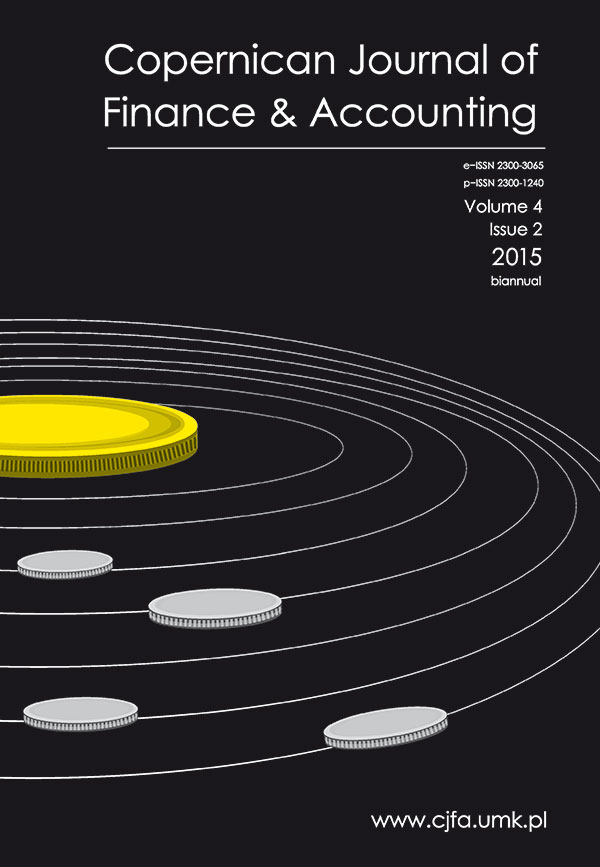Lobbying on the IASB Standards: An analysis of the Lobbyists’ Behaviour over Period 2006–2014
DOI:
https://doi.org/10.12775/CJFA.2015.020Parole chiave
Lobbying, Accounting standards, IASB, Rational model of lobbyingAbstract
The paper investigates whether there is any significant difference in lobbying behaviour on the IASB’s projects depending on the type of a project. In particular, we scrutinise the differences in number of comments letters received for: (a) major vs. minor projects; (b) projects successfully completed after the exposure draft phase vs. projects revised/stopped after the exposure draft phase. To test our two hypotheses about the pattern of lobbyist behaviour, we use reasoning based on a rational lobbying model developed by Sutton (1984). Our paper limits the scope to the IASB’s projects on its agenda over period 2006–2014; we thus complement previous studies of Kenny & Larson (1995) and Jorissen et al. (2012), who analysed the lobbying on IASB’s standards over periods 1989–1992, and 2002–2006 respectively. Our results show that the IASB inclines to succumb to the pressure of lobbying parties if the lobbying is quite massive (measured by number of comment letters submitted) in relation to other projects. We supplement the literature on lobbying on accounting standards with additional evidence on general ability of the lobbyist to influence the decision of standard- -setters by pushing them to revise a project substantially, or even to stop the project in question completely.
Riferimenti bibliografici
Amershi, A. H., Demski, J. S., & Wolfson, M. A. (1982). Strategic Behavior and Regulation Research in Accounting. Journal of Accounting and Public Policy, 1(1), 19–32. http://dx.doi.org/10.1016/0278-4254(82)90004-7.
Chee Chiu Kwok, W., & Sharp, D. (2005). Power and International Accounting Standard Setting: Evidence from Segment Reporting and Intangible Assets Projects. Accounting, Auditing & Accountability Journal, 18(1), 74–99. http://doi.org/10.1108/09513570510584665.
Chung, D. Y. (1999). The Informational Effect of Corporate Lobbying Against Proposed Accounting Standards. Review of Quantitative Finance & Accounting, 12(3), 243–269.
Crawford, L., Ferguson, J., Helliar, C. V., & Power, D. M. (2014). Control over Accounting Standards within the European Union: The Political Controversy Surrounding the Adoption of IFRS 8. Critical Perspectives on Accounting, 25(4–5), 304–318. http://dx.doi.org/10.1016/j.cpa.2013.03.001.
Demski, J. S. (1974). Choice among Financial Reporting Alternatives. The Accounting Review, 49(2), 221–232.
Durocher, S., & Fortin, A. (2011). Practitioners’ Participation in the Accounting Standard-Setting Process. Accounting and Business Research, 41(1), 29–50.
Georgiou, G. (2004). Corporate Lobbying on Accounting Standards: Methods, Timing and Perceived Effectiveness. Abacus, 40(2), 219–237.
Georgiou, G. (2010). The IASB Standard-setting Process: Participation and Perceptions of Financial Statement Users. The British Accounting Review, 42(2), 103–118. http://doi.org/10.1016/j.bar.2010.02.003.
Giner, B., & Arce, M. (2012). Lobbying on Accounting Standards: Evidence from IFRS 2 on Share-Based Payments. European Accounting Review, 21(4), 655–691. http://doi.org/10.1080/09638180.2012.701796.
Guenther, D. A., & Hussein, M. E. A. (1995). Accounting Standards and National Tax Laws: The IASC and the Ban on LIFO. Journal of Accounting and Public Policy, 14(2), 115–141. http://doi.org/10.1016/0278-4254(95)00001-U.
Jorissen, A., Lybaert, N., Orens, R., & Van Der Tas, L. (2012). Formal Participation in the IASB’s Due Process of Standard Setting: A Multi-issue/Multi-period Analysis. European Accounting Review, 21(4), 693–729. http://doi.org/10.1080/09638180.2010.522775.
Kenny, S. Y., & Larson, R. K. (1993). Lobbying Behaviour and the Development of International Accounting Standards: The Case of the IASC’s Joint Venture Project. European Accounting Review, 2(3), 531–554. http://doi.org/10.1080/09638189300000050.
Kenny, S. Y., & Larson, R. K. (1995). The Development of International Accounting Standards: An Analysis of Constituent Participation in Standard-Setting. International Journal of Accounting, 30(4), 283–301.
Königsgruber, R. (2010). A Political Economy of Accounting Standard Setting. Journal of Management & Governance, 14(4), 277–295. http://doi.org/10.1007/s10997-009-9101-1.
Krueger, A. O. (1974). The Political Economy of the Rent-Seeking Society. The American Economic Review, 64(3), 291–303.
Larson, R. K. (1997). Corporate Lobbying of the International Accounting Standards Committee. Journal of International Financial Management and Accounting, 8(3), 175–203. http://doi.org/10.1111/1467-646X.00024.
Larson, R. K., & Brown, K. L. (2001). Lobbying of the International Accounting Standards Committee: The Case of Construction Contracts. Advances in International Accounting, 14, 47–73. http://doi.org/10.1016/S0897-3660(01)14005-5.
MacArthur, J. B. (1999). The Impact of Cultural Factors on the Lobbying of the International Accounting Standards. Journal of International Accounting, Auditing & Taxation, 8(2), 315. http://doi.org/10.1016/S1061-9518(99)00018-X.
Ordelheide, D. (2004). The Politics of Accounting: A Framework. In The Economics and Politics of Accounting: International Perspectives on Research Trends, Policy, and Practice (p. 404). New York: Oxford University Press.
Orens, R., Jorissen, A., Lybaert, N., & Van Der Tas, L. (2011). Corporate Lobbying in Private Accounting Standard Setting: Does the IASB have to Reckon with National Differences? Accounting in Europe, 8(2), 211–234. http://doi.org/10.1080/17449480.2011.621672.
Samuelson, P. A. (1938). A Note on the Pure Theory of Consumer’s Behaviour. Economica, 5(17), 61–71. http://doi.org/10.2307/2548836.
Schalow, C. M. (1995). Participation Choice: The Exposure Draft for Postretirement Benefits Other Than Pensions. Accounting Horizons, 9(1), 27–41.
Solomons, D. (1978). The Politicization of Accounting. Journal of Accountancy, 146(5), 65–72.
Stenka, R., & Taylor, P. (2010). Setting UK Standards on the Concept of Control: An Analysis of Lobbying Behaviour. Accounting and Business Research, 40(2), 109–130. http://doi.org/10.1080/00014788.2010.9663387.
Sutton, T. G. (1984). Lobbying of Accounting Standard-Setting Bodies in the U.K. and the U.S.A.: A Downsian Analysis. Accounting, Organizations and Society, 9(1), 81–95. http://doi.org/10.1016/0361-3682(84)90031-X.
Watts, R. L., & Zimmerman, J. L. (1978). Towards a Positive Theory of the Determination of Accounting Standards. The Accounting Review, 53(1), 112–134.
Zeff, S. A. (2002). “Political” Lobbying on Proposed Standards: A Challenge to the IASB. Accounting Horizons, 16(1), 43–54. http://dx.doi.org/10.2308/acch.2002.16.1.43.
Zeff, S. A. (2005). The Evolution of U.S. GAAP: The Political Forces Behind Professional Standards. CPA Journal, 75(2), 19–29.
Zeff, S. A. (2012). The Evolution of the IASC into the IASB, and the Challenges it Faces. The Accounting Review, 87(3), 807–837. http://dx.doi.org/10.2308/accr-10246.
Zülch, H., & Hoffmann, S. (2010). Lobbying on Accounting Standard Setting in a Parliamentary Environment–A Qualitative Approach. HHL Working Paper. 94, 53.
Downloads
Pubblicato
Come citare
Fascicolo
Sezione
Stats
Number of views and downloads: 1126
Number of citations: 0



